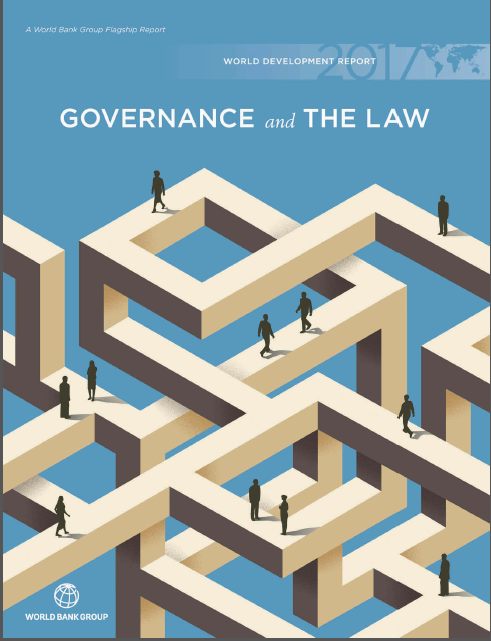
World development report : Governance and Law
Publication Year: 2017 / Sources: World Bank GroupWhy are carefully designed, sensible policies too often not adopted or implemented? When they are, why do they often fail to generate development outcomes such as security, growth, and equity? And why do some bad policies endure? This World Development Report 2017: Governance and the Law addresses these fundamental questions, which are at the heart of development. Policy making and policy implementation do not occur in a vacuum. Rather, they take place in complex political and social settings, in which individuals and groups with unequal power interact within changing rules as they pursue conflicting interests. The process of these interactions is what this Report calls governance, and the space in which these interactions take place, the policy arena. The capacity of actors to commit and their willingness to cooperate and coordinate to achieve socially desirable goals are what matter for effectiveness.
Download: English | Khmer
Full Report: Cambodia’s Mineral Exploration Licensing Process: Governance Risk Assessment
Publication Year: 2017 / Sources: Transparency International CambodiaThis Governance Risk Assessment was conducted as part of Transparency International’s Mining for Sustainable Development (M4SD) Programme. The aim of this study is to identify the systemic, regulatory and institutional vulnerabilities to malpractice in awarding mining and mining-related licences, permits and contracts. The study will also assess the specific governance risks created by these vulnerabilities and present recommendations. This report presents the main findings from the research and the results of the risk assessment.
Download: English | Khmer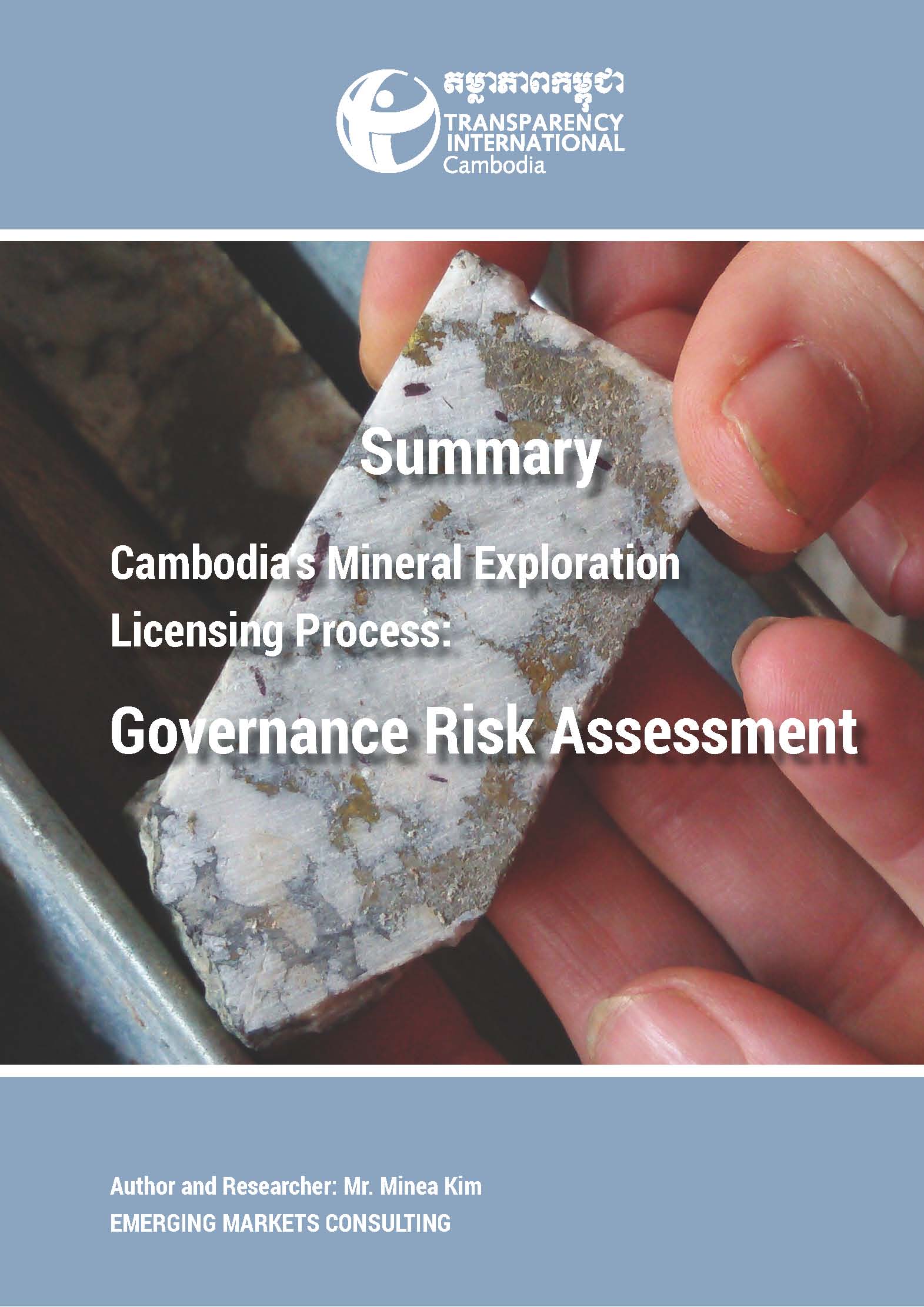
Summary: Cambodia’s Mineral Exploration Licensing Process: Governance Risk Assessment
Publication Year: 2017 / Sources: Transparency International CambodiaThis Governance Risk Assessment was conducted as part of Transparency International’s Mining for Sustainable Development (M4SD) Programme. The aim of this study is to identify the systemic, regulatory and institutional vulnerabilities to malpractice in awarding mining and mining-related licences, permits and contracts. The study will also assess the specific governance risks created by these vulnerabilities and present recommendations. This report presents the main findings from the research and the results of the risk assessment.
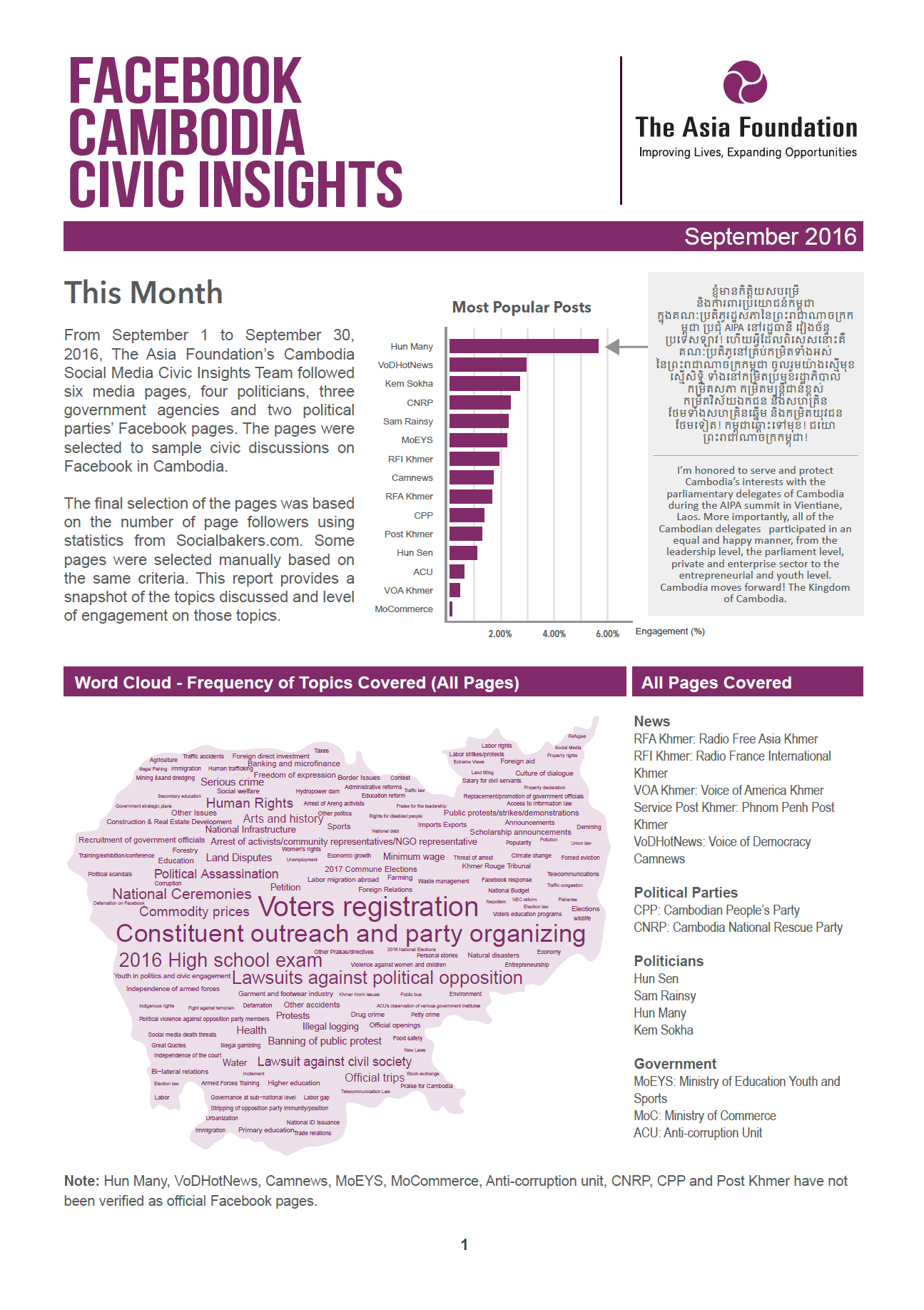
Facebook Cambodia Civic Insights 2016
Publication Year: 2016 / Sources: The Asia FoundationFrom September 1 to September 30, 2016, The Asia Foundation’s Cambodia Social Media Civic Insights Team followed six media pages, four politicians, three government agencies and two political parties’ Facebook pages. The pages were selected to sample civic discussions on Facebook in Cambodia.
Download: English | Khmer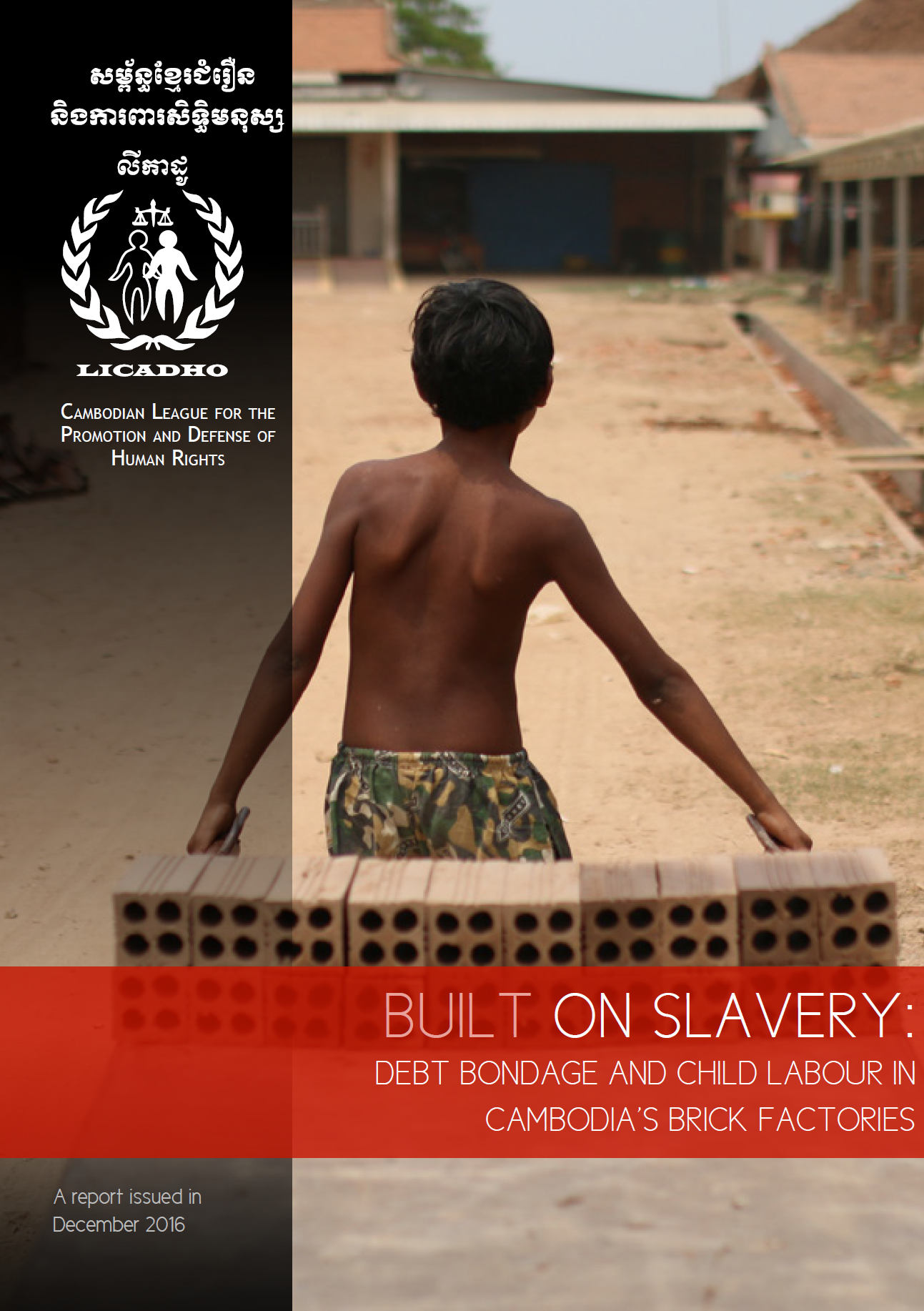
Built on Slavery: Debt Bondage and Child Labour in Cambodia’s Brick Factories
Publication Year: 2016 / Sources: Cambodian League for the Promotion and Defense of Human Rights (LICADHO)The interviews and group discussions covered a range of topics including details of the interviewees’ daily lives and their work; their financial situations and the amount of debt owed by them or their families; how they had come to brick factory work; employment practices; the use of child labour; access to education; and injuries caused by factory machinery.
Download: English | Khmer
Rule of Law Index 2015
Publication Year: 2015 / Sources: World Justice Project (WJP)The Rule of Law Index 2015 was prepared by The World Justice Project (WJP)’s research team. This research has measured on 8 factors: constraints on government powers, absence of corruption, open government, fundamental rights, order and security, regulatory enforcement, civil justice, and criminal justice. A ninth factor, informal justice, is measured but not included in aggregated scores and rankings. These factors are intended to reflect how people experience rule of law in everyday life. This WJP Rule of Law Index 2015 are derived from more than more than 100,000 household and expert surveys in 102 countries and jurisdictions. The report showed that Cambodia ranked 99 out of 102 countries and dead last in the East Asia and Pacific region.
Download: English | Khmer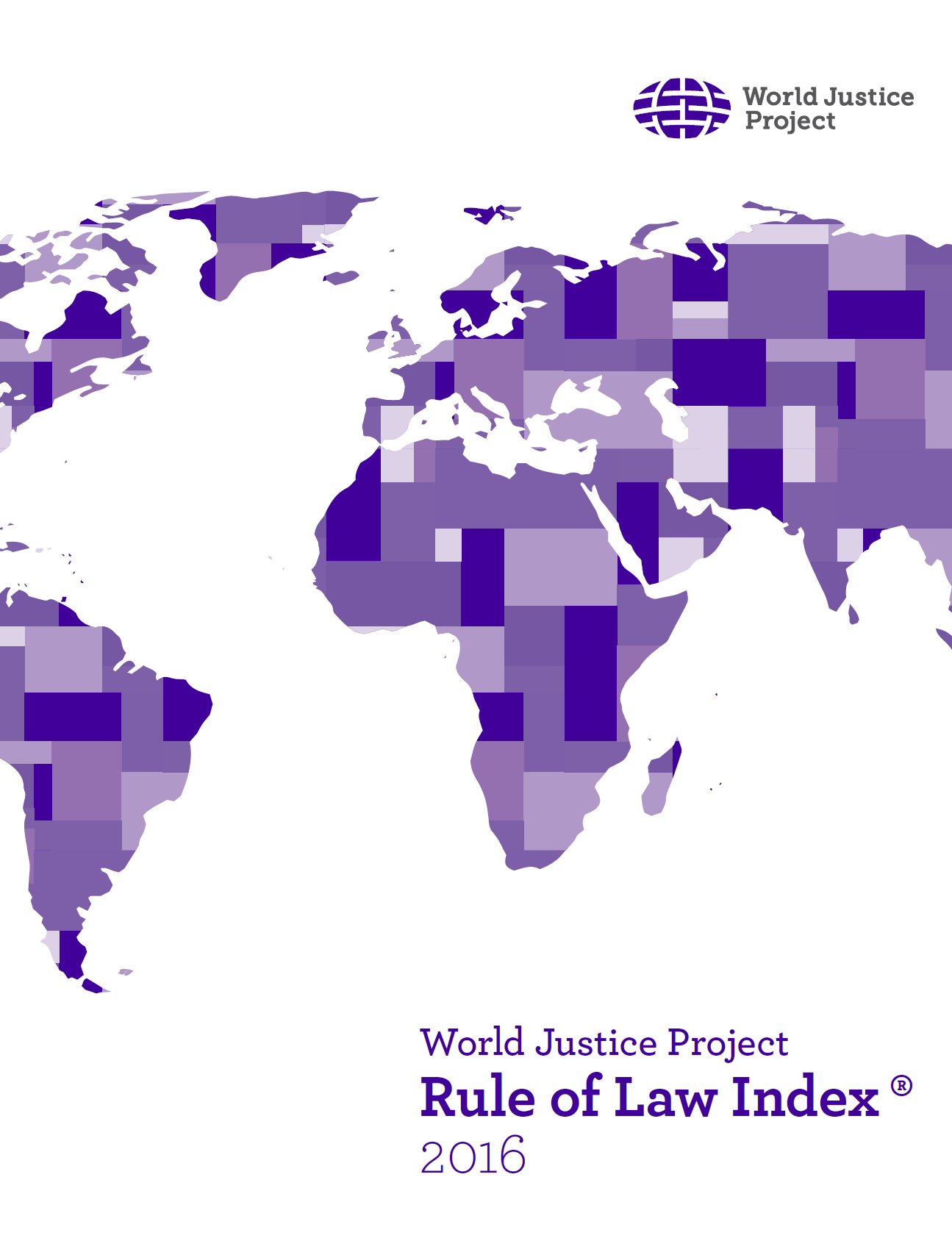
Rule of Law Index 2016
Publication Year: 2016 / Sources: World Justice Project (WJP)The Rule of Law Index 2016 was prepared by The World Justice Project (WJP)’s research team. This research has measured on 9 factors: constraints on government powers, absence of corruption, open government, fundamental rights, order and security, regulatory enforcement, civil justice, and criminal justice. A ninth factor, informal justice, is measured but not included in aggregated scores and rankings. These factors are intended to reflect how people experience rule of law in everyday life. This WJP Rule of Law Index 2016 are derived from more than 110,000 households and 2,700 expert surveys in 113 countries and jurisdictions. The reports showed that Cambodia ranked 112 out of 113 countries and dead last in the East Asia and Pacific region. Of the 15 countries surveyed from the East Asia and Pacific region, Cambodia scored lowest and New Zealand highest, with countries like Mongolia and Malaysia falling somewhere in between. Among all 113 countries rated worldwide, Cambodia came in 112, scoring just below Afghanistan and above only Venezuela, a country experiencing food shortages and frequent violence. Cambodia dropped two points in the ranking since last year’s report.
Download: English | Khmer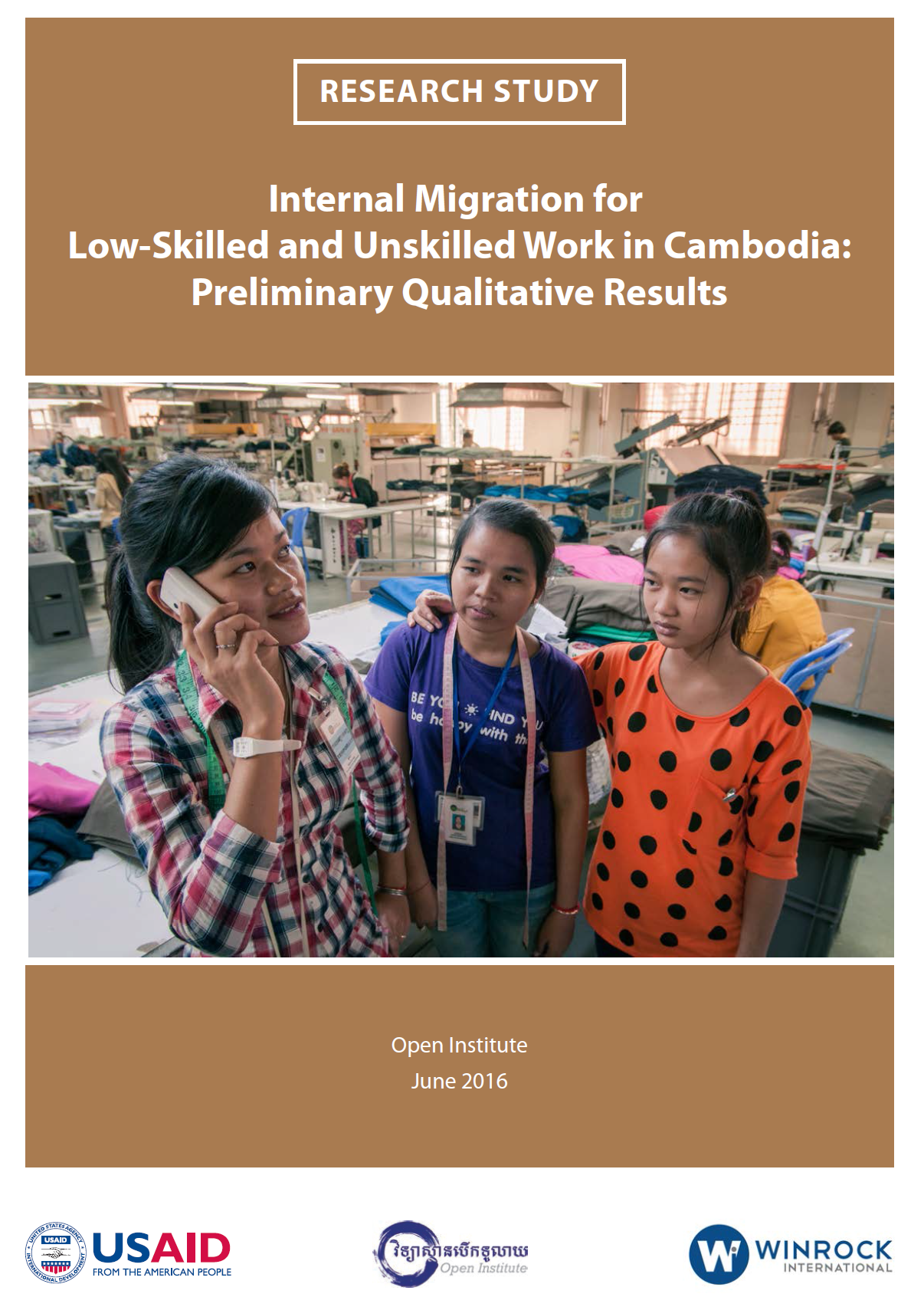
Internal Migration for Low-skilled and Unskilled Work in Cambodia: Preliminary Qualitative Results
Publication Year: June 2016 / Sources: Open InstituteIn order to propose solutions to reduce the disconnect between the national demand for unskilled and low-skilled employment and potential national workers, it is first necessary to undertake qualitative research with the following objectives:
1. To have a preliminary understanding of the structure of the main sectors that absorb national migration: garment, construction, hospitality and security
2. To have a preliminary understanding of the present hiring process of local Cambodian employers in the targeted sectors
3. To have a preliminary understanding of internal migration paths and practices
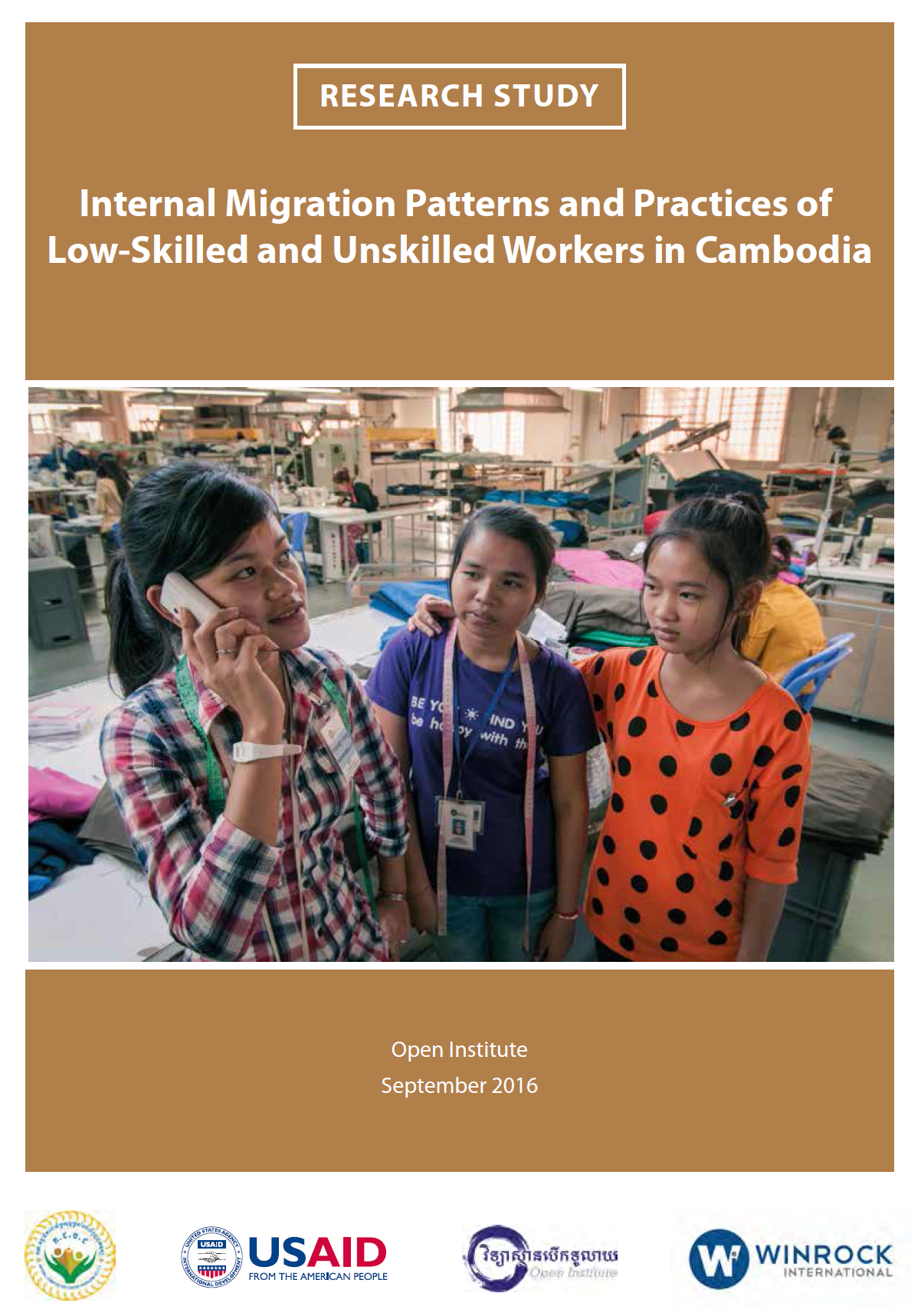
Internal Migration Patterns and Practices of Low-skilled and Unskilled Workers in Cambodia
Publication Year: Sep, 2016 / Sources: Open InstituteThe data shows that there is constant availability of work all year round in the sectors of Manufacturing, Construction, Hospitality and Security, with a peak of labor demand after the two main holidays. The main and most effective method of communication used by companies to find new employees is to communicate the job opportunities to their existing workers, who relay this information to potential workers who might be interested. HR managers are nevertheless technology-savvy and they are open to use electronic channels to find new workers.
The main conclusion is that, while a clear mechanism for accessing low-skilled and unskilled employment exists in Cambodia based on the trust relationships between potential migrants and family members and friends who are already working, this
mechanism is not sufficient to meet the demand for unskilled and low-skilled labor in the country, nor does it provide work in Cambodia to all potential migrants who would prefer to work in their own country. A significant portion of cross-border migration is most probably motivated by this disconnect.
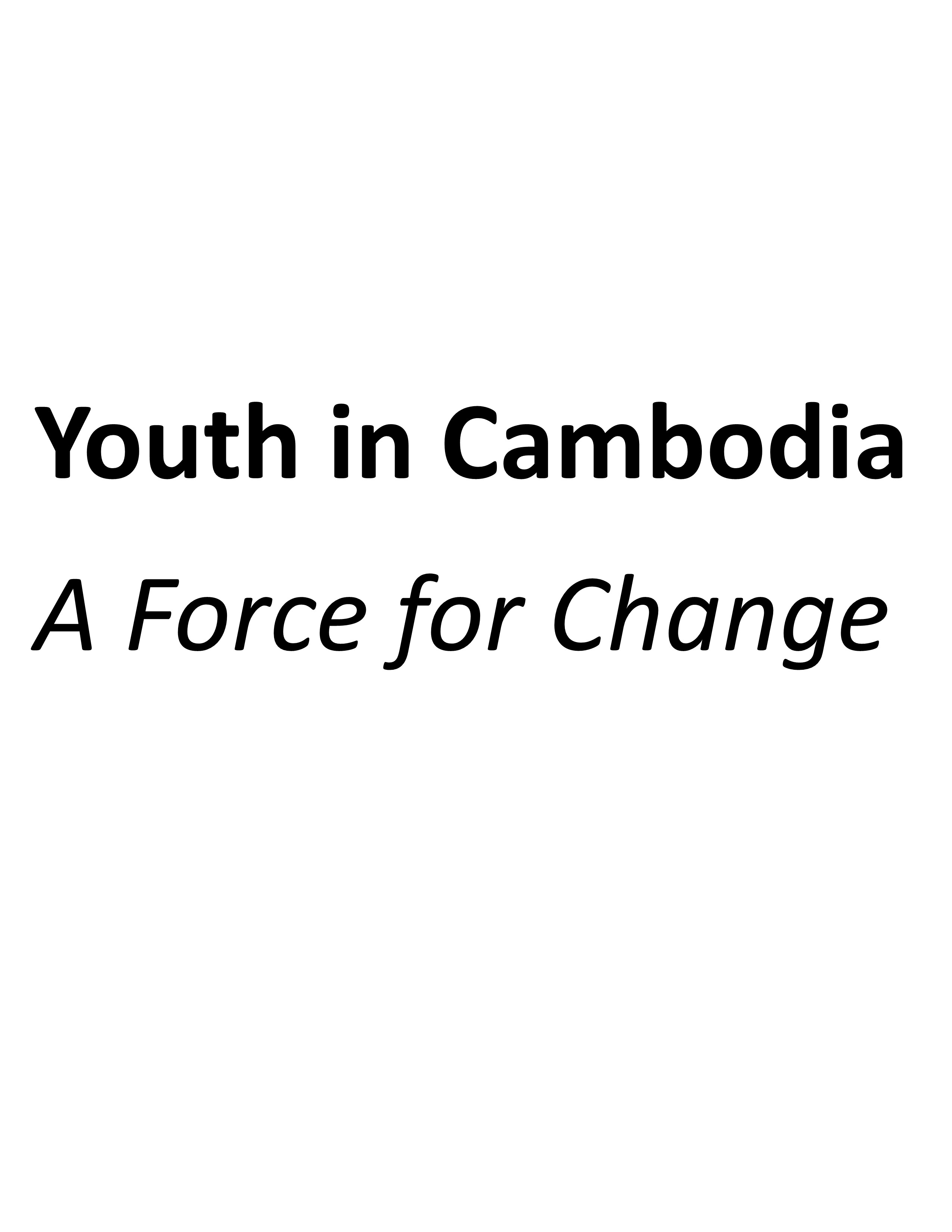
Youth in Cambodia: A Force for Change
Publication Year: 2008 / Sources: Pact CambodiaMore than half the population of Cambodia is less than 20 years old, and youth comprise almost 20% of the total population. Unlike some countries in Southeast Asia where this percentage is expected to decline by 2030, the proportion of youth in the population is expected to peak in 2035 with average annual growth of 0.1% in 2005-2015 and 1.0% in 2025-2035.
Download: English | Khmer